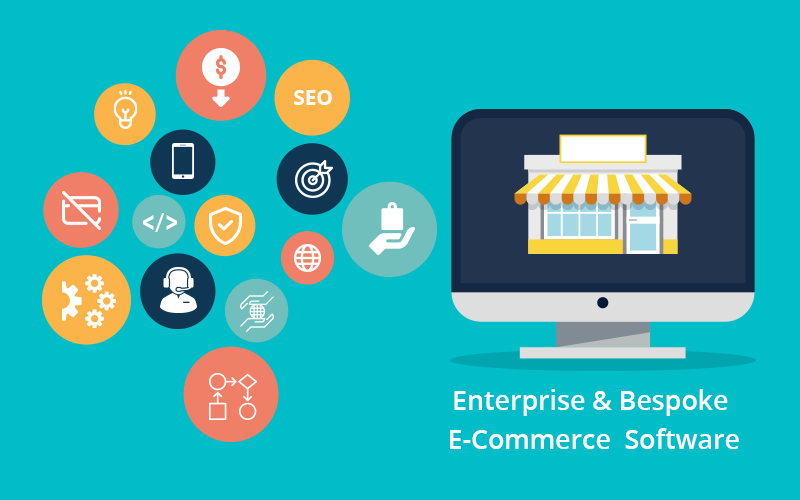Things Not To Be Missed Before Choosing The Right Enterprise Ecommerce Software
- by eSellerHub

When it comes to choosing the right eCommerce platform or migrating to an Enterprise eCommerce software, it remains a tough decision for most businesses. Enterprise eCommerce software is expensive as it requires a lump-sum time and resources to implement, run, and maintain. Thus you must stay well organized and have a systematic approach in your research and decision-making process. Selecting the wrong platform for your business can have a considerable impact on both the short and long-term.
While selecting enterprise eCommerce software, it is essential to include your technical team and eCommerce, trading team. It would be best if you take up opinions from operations to marketing to customer services and then derive a business-level decision. In many cases, consultants outside the organization are brought in for obtaining objective feedback on what is strictly needed for your company to make sure that the process is well -structured, factoring in the right considerations, going with the correct right technologies are viewed.
About Enterprise eCommerce Platform
Enterprise eCommerce platforms allow enterprise businesses to sell their products online. It is usually the large scale businesses that opt for enterprise-grade software as it has additional features compared to the standard software.
Specific enterprise eCommerce platforms are delivered in software packages, but nowadays, most platforms are cloud-based. It simplifies or even eliminates the software installation and upgrades necessities. More essential features mean higher costs incurred for the enterprise software.
Important Enterprise eCommerce Features
Every single leading eCommerce platform has basic retail features; however; enterprise businesses require much more abilities like:
- Managing several product categories from multiple stores for customers belonging to different locations.
- Integration with the company’s other systems like accounting, customer relationship management (CRM) systems, inventory, etc.
- Tracking data of customer’s past purchases and recommend similar or akin items based on their purchasing history.
- Scalable to meet high traffic demand situations of an enterprise-level business.
How to Choose an Enterprise Commerce Platform
Be it your first enterprise eCommerce platform or you have already got an existing one, uncovering a platform suitable for your needs or migrating to the right platform can be all the more daunting. Although loaded with non-compromising features, it does take a lot of time and effort to install, integrating with third-party systems, and learn to use it effectively.
Thus, following tips for choosing the right enterprise eCommerce software is critical for enterprise businesses to ensure they select an eCommerce solution that fits their requirements.
- B2B, B2C, or D2C – Most eCommerce platforms suit a particular customer base. Solutions that work equally well with all three business models B2B, B2C, and D2C for managing corporate accounts, request for quotes, split shipping, multi-level user access, and deep integration with a CRM are all added advantage.
- Discuss with stakeholders – Choosing an enterprise eCommerce platform can be challenging, and it is best to involve multiple departments in the deciding process. Various inputs from different angles can be gathered based on each department’s need, thus ensuring that you go for the right one that can be effectively used.
- Decide between SaaS, IaaS, PaaS – The majority of today’s solutions are based on the cloud. However, there are various other service models like software as a Service (SaaS), Infrastructure as a Service (IaaS), and Platform as a Service (PaaS). Knowing their advantages and disadvantages can help you boil down to the one you need.
From a top-level, few vital considerations that have focused on while selecting a platform are:
- eCommerce Pricing / Licensing Model – involves how the licensing costs are calculated and billed.
- Technical angle – it denotes the platform fitness from a technical angle like SaaS platform, API-first, or headless-only platform.
- Business angle –objectives of businesses every so often aligns well among different platforms. For instance, DTC brands prioritize agility over extensibility.
- Native feature-set – features like multiple-store architecture or PIM abilities can be crucial for some businesses. So this native feature set is indeed a key area.
- Extensibility – the ability to grow with the business expansion and their eCommerce operations is vital. Today, going with the right APIs for bringing additional channels or shifting to a headless methodology can be an essential factor.
Related Article: Selecting Right Ecommerce Platform: Key Considerations for Your Business
Final Thoughts
Always beginning with internal research and knowing your particular functional and non-functional needs can prove beneficial instead of looking at various solutions right away. Try having the assistance of a Business Analyst or a consultant who can help assess and recognize the business-critical necessities and the non-essential ones. We offer off-the-shelf eCommerce solutions and customized Enterprise eCommerce software that’s ideal for every online business player.
You can know more about our custom eCommerce software development and other services by dialing +1 408 600 0534.